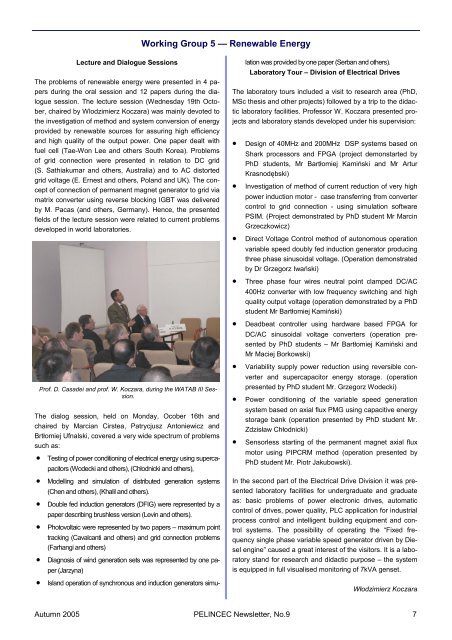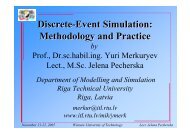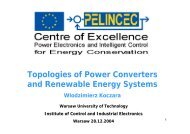PELINCEC 2005 - Politechnika Warszawska
PELINCEC 2005 - Politechnika Warszawska
PELINCEC 2005 - Politechnika Warszawska
Create successful ePaper yourself
Turn your PDF publications into a flip-book with our unique Google optimized e-Paper software.
Lecture and Dialogue Sessions<br />
The problems of renewable energy were presented in 4 papers<br />
during the oral session and 12 papers during the dialogue<br />
session. The lecture session (Wednesday 19th October,<br />
chaired by Wlodzimierz Koczara) was mainly devoted to<br />
the investigation of method and system conversion of energy<br />
provided by renewable sources for assuring high efficiency<br />
and high quality of the output power. One paper dealt with<br />
fuel cell (Tae-Won Lee and others South Korea). Problems<br />
of grid connection were presented in relation to DC grid<br />
(S. Sathiakumar and others, Australia) and to AC distorted<br />
grid voltage (E. Ernest and others, Poland and UK). The concept<br />
of connection of permanent magnet generator to grid via<br />
matrix converter using reverse blocking IGBT was delivered<br />
by M. Pacas (and others, Germany). Hence, the presented<br />
fields of the lecture session were related to current problems<br />
developed in world laboratories.<br />
Prof. D. Casadei and prof. W. Koczara, during the WATAB III Session.<br />
The dialog session, held on Monday, Ocober 16th and<br />
chaired by Marcian Cirstea, Patrycjusz Antoniewicz and<br />
Brtłomiej Ufnalski, covered a very wide spectrum of problems<br />
such as:<br />
• Testing of power conditioning of electrical energy using supercapacitors<br />
(Wodecki and others), (Chłodnicki and others),<br />
• Modelling and simulation of distributed generation systems<br />
(Chen and others), (Khalil and others).<br />
• Double fed induction generators (DFIG) were represented by a<br />
paper describing brushless version (Levin and others).<br />
• Photovoltaic were represented by two papers – maximum point<br />
tracking (Cavalcanti and others) and grid connection problems<br />
(Farhangi and others)<br />
• Diagnosis of wind generation sets was represented by one pa-<br />
per (Jarzyna)<br />
• Island operation of synchronous and induction generators simu-<br />
Working Group 5 — Renewable Energy<br />
lation was provided by one paper (Serban and others).<br />
Laboratory Tour – Division of Electrical Drives<br />
The laboratory tours included a visit to research area (PhD,<br />
MSc thesis and other projects) followed by a trip to the didactic<br />
laboratory facilities. Professor W. Koczara presented projects<br />
and laboratory stands developed under his supervision:<br />
• Design of 40MHz and 200MHz DSP systems based on<br />
Shark processors and FPGA (project demonstarted by<br />
PhD students, Mr Bartłomiej Kamiński and Mr Artur<br />
Krasnodębski)<br />
• Investigation of method of current reduction of very high<br />
power induction motor - case transferring from converter<br />
control to grid connection - using simulation software<br />
PSIM. (Project demonstrated by PhD student Mr Marcin<br />
Grzeczkowicz)<br />
• Direct Voltage Control method of autonomous operation<br />
variable speed doubly fed induction generator producing<br />
three phase sinusoidal voltage. (Operation demonstrated<br />
by Dr Grzegorz Iwański)<br />
• Three phase four wires neutral point clamped DC/AC<br />
400Hz converter with low frequency switching and high<br />
quality output voltage (operation demonstrated by a PhD<br />
student Mr Bartłomiej Kamiński)<br />
• Deadbeat controller using hardware based FPGA for<br />
DC/AC sinusoidal voltage converters (operation presented<br />
by PhD students – Mr Bartłomiej Kamiński and<br />
Mr Maciej Borkowski)<br />
• Variability supply power reduction using reversible converter<br />
and supercapacitor energy storage. (operation<br />
presented by PhD student Mr. Grzegorz Wodecki)<br />
• Power conditioning of the variable speed generation<br />
system based on axial flux PMG using capacitive energy<br />
storage bank (operation presented by PhD student Mr.<br />
Zdzisław Chłodnicki)<br />
• Sensorless starting of the permanent magnet axial flux<br />
motor using PIPCRM method (operation presented by<br />
PhD student Mr. Piotr Jakubowski).<br />
In the second part of the Electrical Drive Division it was presented<br />
laboratory facilities for undergraduate and graduate<br />
as: basic problems of power electronic drives, automatic<br />
control of drives, power quality, PLC application for industrial<br />
process control and intelligent building equipment and control<br />
systems. The possibility of operating the “Fixed frequency<br />
single phase variable speed generator driven by Diesel<br />
engine” caused a great interest of the visitors. It is a laboratory<br />
stand for research and didactic purpose – the system<br />
is equipped in full visualised monitoring of 7kVA genset.<br />
Włodzimierz Koczara<br />
Autumn <strong>2005</strong> <strong>PELINCEC</strong> Newsletter, No.9 7





